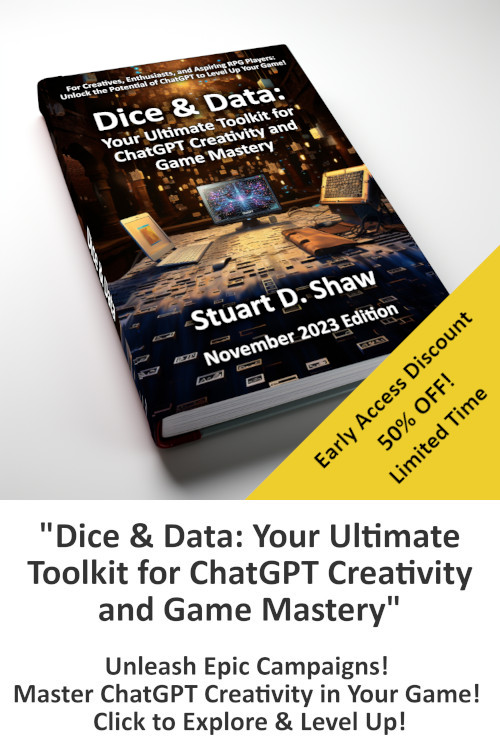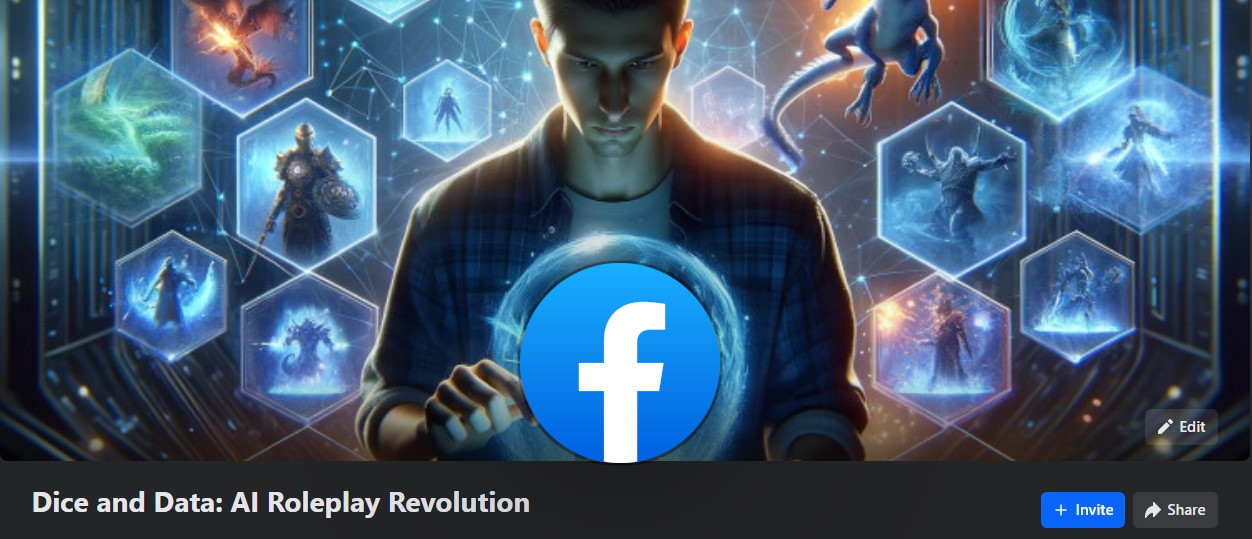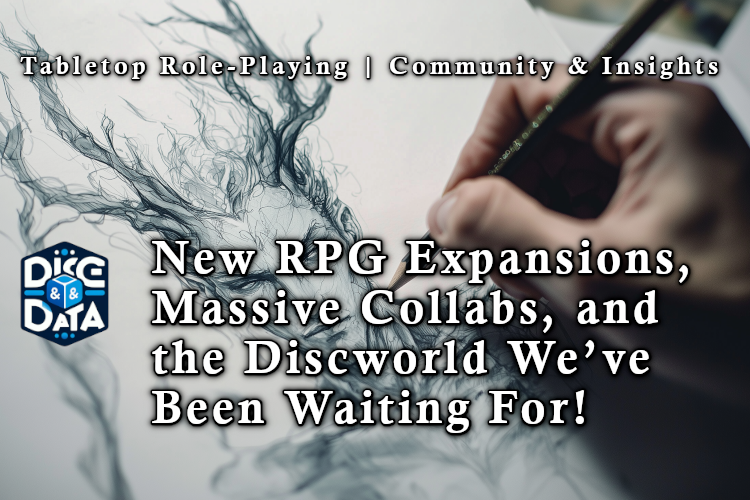- Home
- RPG AI Blog
- TTRPG AI Sentiment Analysis
Analytical Report: AI Integration in RPGs – Community Perception vs. Actual Sentiment
Conducted by:
Stuart Shaw – Linguistic Data Analyst, Senior Customer Insights Advisor (Suncorp), Author of “Dice & Data: Your Ultimate Toolkit for ChatGPT Creativity and Game Mastery”
Date: December 12, 2023
Executive Summary
This analytical report delves into the sentiments of the tabletop role-playing game (TTRPG) community regarding the integration of Artificial Intelligence (AI). Employing both quantitative and qualitative research methodologies, the study rigorously evaluates community attitudes by analysing 365 survey responses and reviewing 295 comments from TTRPG-focused online platforms. The goal is to discern the prevailing perceptions of AI within the community and to contrast these findings with the tone and content of online forum discussions.
Introduction
The advent of AI technologies has sparked a spectrum of responses within the TTRPG community, from enthusiastic endorsement to cautious scepticism. This report seeks to methodically dissect and interpret these varied perspectives. By synthesizing data from a general Dungeons and Dragons Facebook group poll and targeted commentary analysis, we provide a multifaceted view of the community's stance towards AI's role in TTRPGs. Our approach is designed to yield a nuanced understanding of the community's collective sentiment, highlighting areas of consensus as well as contention.
Methodology
- Survey Analysis: A survey with 365 responses were analyzed to gauge the RPG community's sentiment towards the use of AI in tabletop roleplaying games. This poll was posted in a general Dungeons and Dragons Facebook group. Due to the open manner of this survey and the relatively anonymous response mechanism to the poll, the results are considered an approximation of the general sentiment that the TTRPG community has towards AI.1
- Commentary Analysis: A qualitative examination of 295 comments from Facebook groups focused on TTRPGs. These comments, which include responses to a survey poll post, specifically address the topic of AI usage in TTRPGs. It's imperative to note that no personal information was copied, stored, or submitted to any AI for this analysis, maintaining strict adherence to privacy and ethical standards.2
Limitations and Margins of Error
Research Limitations
This study, while rigorous in its approach, is subject to certain limitations that must be acknowledged:
- Sample Representation: The survey and commentary analyses were conducted within specific online communities, which may not comprehensively represent the global RPG community. Consequently, the sentiments expressed may reflect the predispositions of these particular forums.
- Self-Selection Bias: Participation in both the survey and online discussions is voluntary, potentially leading to self-selection bias. This means those with stronger opinions may have been more inclined to respond, which could skew the data towards more extreme viewpoints.
- Survey Scope: The survey's reach, while substantial, was limited to a single Facebook group. The responses, therefore, may be indicative of the sentiment within that group rather than the broader community.
- Temporal Context: Sentiments towards AI can be highly dynamic, influenced by technological advancements and public discourse. The data reflects community sentiment at a specific time and may evolve rapidly with the changing landscape of AI in gaming.
Margins of Error
The findings of this research are indicative and carry inherent margins of error:
- Approximation of Sentiment: The survey results provide an approximation of community sentiment, which may not capture the full nuance of individual perspectives.
- Analytical Subjectivity: Qualitative analysis of comments involves a degree of interpretation, which, despite efforts to maintain objectivity, introduces a margin of subjectivity into the findings.
- Data Incompleteness: The possibility of incomplete data capture from online discussions exists, given the reliance on publicly available comments, which may not include deleted or private discussions.
Indicative Findings and Further Research
Given these limitations and margins of error, the results of this study should be considered indicative rather than definitive. The patterns and trends identified offer valuable insights but also underscore the need for a more comprehensive and methodical approach. A broader, more inclusive research design, perhaps encompassing a wider array of platforms and a longitudinal study framework, could yield findings with greater generalizability and reduced margins of error. Such an approach would be instrumental in validating the preliminary insights derived from this study and in forming a more nuanced understanding of the role of AI in the TTRPG community.
Data Analysis
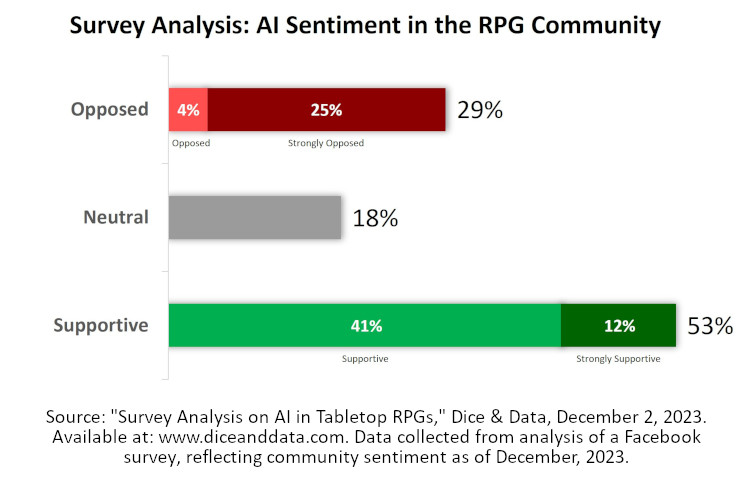
The findings suggest a community leaning towards acceptance of AI, with a significant portion actively endorsing it:
- Strongly Opposed: 25% express a robust opposition to AI in TTRPGs, potentially due to concerns over creative integrity, data privacy, or the authenticity of the gaming experience.
- Opposed: A minimal 4% stand opposed, showing some reservations about AI without strong sentiment.
- Neutral: 18% of the community sits in the neutral zone, possibly indicating ambivalence, or a wait-and-see attitude towards the impact of AI on TTRPGs.
- Supportive: A notable 41% express general support, suggesting that a substantial majority recognize the potential advantages of AI without the intensity of the 'strongly supportive' group.
- Strongly Supportive: 12% of respondents are enthusiastic proponents of AI, indicating a segment that may perceive AI as a beneficial tool for enhancing the TTRPG experience.
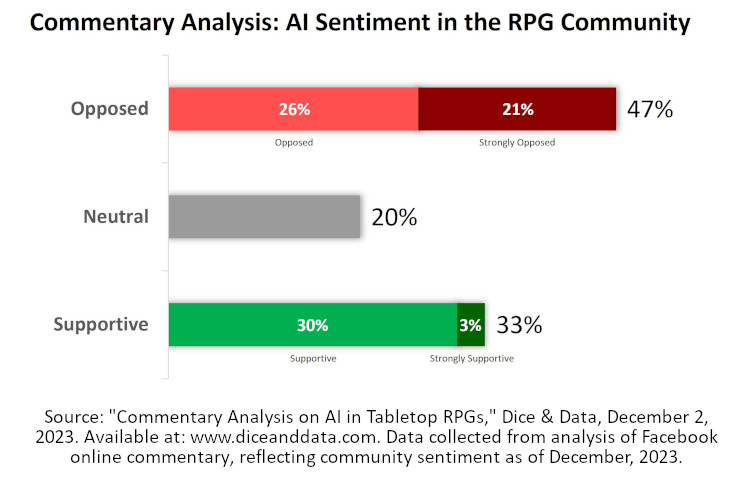
The qualitative commentary analysis reveals a more pronounced expression of sentiment, with a tilt towards opposition:
- Strongly Opposed: Mirroring the survey, a substantial 21% of commenters are firmly against AI, reinforcing the notion that those with strong objections are more inclined to express their views.
- Opposed: The opposed sentiment increases to 26% within the commentary, suggesting that those with negative views on AI are more likely to share their opinions publicly.
- Neutral: 20% of comments reflect a neutral stance, a slight increase from the survey, which could signify an engagement bias where neutrals are more likely to engage in discussion than to participate in surveys.
- Supportive: 30% of comments show support, aligning somewhat with the survey but with a lower percentage, indicating the possibility of a silent supportive majority.
- Strongly Supportive: Only 3% of commenters actively advocate for AI, a stark contrast to the survey results, suggesting that those in strong support may be less vocal in open forums.
Comparative Analysis
The juxtaposition of survey data with online commentary portrays a nuanced landscape of AI sentiment within the TTRPG community. While the survey indicates a leaning towards support, the online discourse suggests a more vocally expressed opposition. This discrepancy may result from the varying nature of engagement in anonymous surveys versus public forums, where individuals with strong opinions may be more motivated to voice their concerns or endorsements.
The data indicates that while a vocal minority may skew public perception, the broader community's sentiment is more balanced, with a tendency towards acceptance of AI in TTRPGs. This insight is crucial for stakeholders in the TTRPG industry, including game designers, AI developers, and community leaders, to understand the complex dynamics at play and to address the concerns and expectations of their audience effectively.
Ethical Considerations
In conducting this analysis, we upheld the highest standards of privacy and data protection. No individual's personal data was collected, processed, or stored at any stage of this study. Our methodology conformed to the stringent ethical guidelines and privacy standards established for scholarly research, ensuring that all data utilized was devoid of personally identifiable information.
Conclusions
Our comprehensive analysis has surfaced a notable divergence between the TTRPG community's general sentiment towards AI in TTRPGs and the prevailing tone within online discussions. The survey data portrays a relatively balanced array of viewpoints, whereas online discourse appears to be disproportionately influenced by a vocally oppositional minority. This dynamic may be skewing the perceived consensus on AI within TTRPGs and potentially shaping an inaccurate public narrative.
Recommendations
- Fostering Balanced Participation: We recommend a proactive approach to cultivating a more representative online discourse by encouraging a wider spectrum of the community—particularly those with supportive or neutral views—to engage in conversations about AI in RPGs.
- Implementing Educational Initiatives: There is a clear need for the dissemination of factual and comprehensive information regarding the role and impact of AI in TTRPGs. This would serve to demystify AI technology, address prevalent misconceptions, and elucidate the actual benefits and challenges it presents.
- Promoting Constructive Engagement: We advocate for the creation and nurturing of platforms that facilitate respectful and informed dialogue among community members with diverse opinions. Such platforms should aim to bridge understanding and foster a space where constructive conversations can lead to consensus-building.
Future Research and Additions
- Expanded Data Collection: To further substantiate our findings, we express a readiness to extend the scope of data collection. A more expansive dataset could enable a deeper and more granular analysis, potentially yielding even more insightful conclusions.
- Preparation for Peer Review: We acknowledge the value of peer review in academic and professional spheres and express our willingness to augment this report with additional detail and to subject our methods and findings to the scrutiny of external experts.
Appendixes
1 Facebook Survey Poll: [https://www.facebook.com/groups/2204479412/posts/10161086271114413/]
2 Commentary Analysis: [https://www.diceanddata.com/support-files/commentary_analysis_ai_in_ttrpgs.pdf]

Written by Stuart Shaw, a 40-year veteran of tabletop role-playing games. His journey started with Dungeons & Dragons in 1983, and he is the author of "Dice and Data: Your Ultimate Toolkit for ChatGPT Creativity and Game Mastery". Stuart is eager to share his passion and expertise with the world and enjoys writing about news and innovations in the RPG world. Join him on an exciting adventure into the world of TTRPGs. About me.
